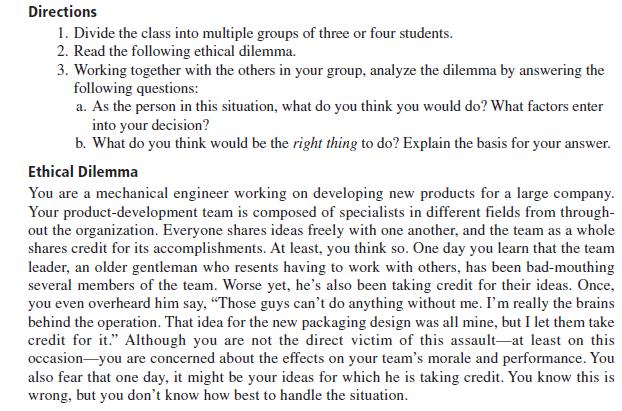Question:
More often than you might imagine, managers confront situations in which they have to decide the right thing to do. Such “ethical dilemmas,” as they are known, are usually quite challenging.
Discussing ethical dilemmas with others is often a useful way of shedding light on the ethical path by identifying ethical considerations that you may have overlooked on your own. This exercise will give you an opportunity to analyze an ethical dilemma.

Questions for Discussion
1. Did the members of your group generally agree or disagree about what they would do in the situation described? What new viewpoints, if any, did you learn from others in your group?
2. Did the members of your group generally agree or disagree about what they thought was the right thing to do? What were the major points of agreement and disagreement?
3. Have you or members of your group ever been in similar situations? If so, how were they handled? From your own experiences and the experiences of others, what did you learn about handling an ethical dilemma of this nature?
Transcribed Image Text:
Directions 1. Divide the class into multiple groups of three or four students. 2. Read the following ethical dilemma. 3. Working together with the others in your group, analyze the dilemma by answering the following questions: a. As the person in this situation, what do you think you would do? What factors enter into your decision? b. What do you think would be the right thing to do? Explain the basis for your answer. Ethical Dilemma You are a mechanical engineer working on developing new products for a large company. Your product-development team is composed of specialists in different fields from through- out the organization. Everyone shares ideas freely with one another, and the team as a whole shares credit for its accomplishments. At least, you think so. One day you learn that the team leader, an older gentleman who resents having to work with others, has been bad-mouthing several members of the team. Worse yet, he's also been taking credit for their ideas. Once, you even overheard him say, "Those guys can't do anything without me. I'm really the brains behind the operation. That idea for the new packaging design was all mine, but I let them take credit for it." Although you are not the direct victim of this assault-at least on this occasion you are concerned about the effects on your team's morale and performance. You also fear that one day, it might be your ideas for which he is taking credit. You know this is wrong, but you don't know how best to handle the situation.







